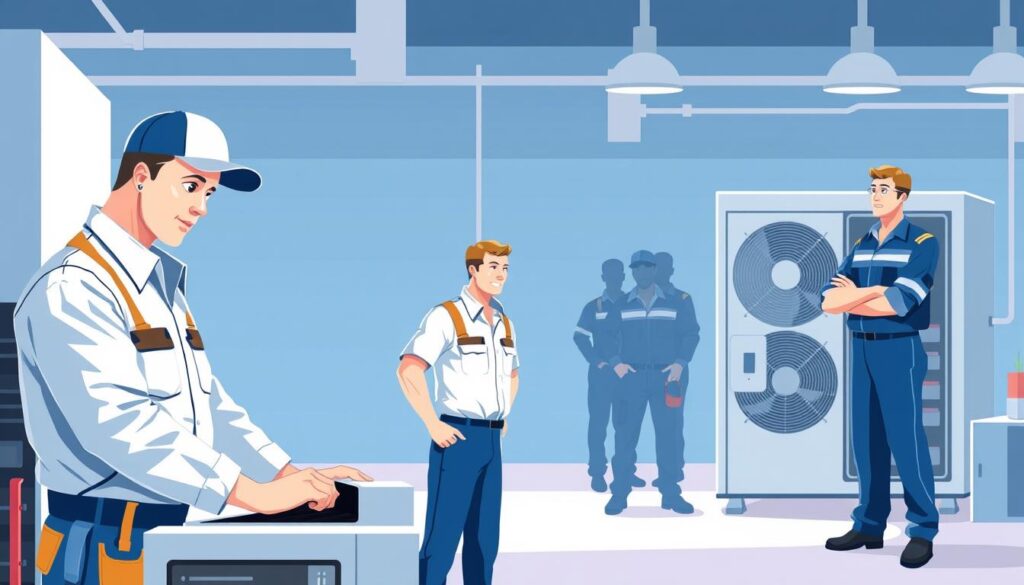How Many Hours Do HVAC Techs Work? Ever wondered what a typical workweek looks like for an HVAC technician? Imagine a career where your schedule can change as quickly as the temperature outside. How many hours do HVAC techs actually work, and what makes their HVAC technician work schedule so unique?

The world of HVAC technicians is dynamic and challenging. These skilled professionals keep our homes and businesses comfortable, working through extreme weather conditions and unpredictable service demands. Their work hours can fluctuate dramatically, influenced by seasonal needs, emergency repairs, and regional climate variations.
From scorching summers in Texas to freezing winters in Alaska, HVAC technicians adapt their schedules to meet critical comfort needs. Your career in this field promises excitement, variability, and the satisfaction of providing essential services to communities across the United States.
Key Takeaways
- HVAC technicians typically work 40-70 hours per week during peak seasons
- Work hours vary significantly based on location and seasonal demand
- Technicians often have flexible and dynamic work schedules
- Emergency calls and seasonal needs can dramatically impact work hours
- Potential for overtime and additional compensation during peak seasons
Table of Contents
Understanding the HVAC Technician Career Path
The HVAC industry is full of exciting career paths for those who love technical work. HVAC technicians are key to keeping places comfortable and safe. They make sure heating, cooling, and ventilation systems work well in homes, businesses, and public areas.
What Does an HVAC Technician Do?
HVAC technicians install, maintain, and fix complex systems. Their work includes many tasks that need technical skills and problem-solving abilities.
- Install new HVAC equipment
- Perform routine maintenance
- Diagnose system problems
- Replace faulty components
- Conduct performance tests
Types of HVAC Technical Roles
The HVAC field has many special roles with different hours and tasks.
| Role | Primary Responsibilities | Experience Level |
|---|---|---|
| Residential Technician | Home system installations and repairs | Entry to Mid-level |
| Commercial Technician | Large building system maintenance | Mid to Senior-level |
| Industrial Specialist | Complex industrial cooling systems | Senior-level |
Industry Demand and Growth
The HVAC industry is growing fast, thanks to new tech and the need for energy-saving systems. Skilled technicians are vital for creating green solutions in homes, businesses, and factories.
The Bureau of Labor Statistics says HVAC jobs will grow a lot. This makes it a great career choice for those interested in this field.
Explore Our HVAC Shop
Looking for top-rated HVAC tools, parts, and accessories? Visit our shop and find the perfect solution for your needs.
Visit the ShopHow Many Hours Do HVAC Techs Work
Working hours for HVAC technicians are varied and flexible. They usually work a standard 40-hour week. But, seasonal needs and emergencies can add more hours.
The typical work schedule for HVAC technicians is as follows:
- Standard work week: 40 hours
- Peak seasons: Up to 50-60 hours per week
- Potential for overtime during extreme temperatures
- Flexible scheduling options
Your hours can change a lot. Some jobs offer four 10-hour days for more flexibility. Emergency repair calls might need you to work evenings and weekends.
Where you work affects your hours too. Home service techs might have different schedules than those in commercial settings. Location, employer, and season also play big roles in your hours.
Pro tip: Being adaptable and prepared for variable work hours is essential in the HVAC industry.
While most work 40 hours, HVAC techs need to be flexible. Handling changing schedules and urgent calls can boost your career and pay.
Explore Our HVAC Shop
Looking for top-rated HVAC tools, parts, and accessories? Visit our shop and find the perfect solution for your needs.
Visit the ShopSeasonal Impact on HVAC Work Hours
The HVAC industry sees big changes all year, with seasons greatly affecting work hours and demands. It’s key for those thinking about HVAC careers or already in the field to know these changes.
Peak Season Hours and Demands
Peak seasons mean HVAC techs often work overtime. Summer and winter are the busiest times, with techs facing long hours. The need for urgent service grows when it’s very hot or cold.
- Summer peaks: High cooling system repairs
- Winter peaks: Critical heating system maintenance
- Emergency calls increase during temperature extremes
Off-Season Work Schedules
Spring and fall are different for HVAC pros. Work might slow down, but smart techs use this time for maintenance and learning.
| Season | Work Characteristics | Typical Hours |
|---|---|---|
| Spring | AC system preparation | 40-45 hours/week |
| Fall | Heating system readiness | 35-40 hours/week |
Regional Weather Influences
Where you work greatly affects your HVAC job. Southern states face intense summer needs, while the north is busier in winter. Knowing your area’s weather helps techs plan for the season.
Professional HVAC technicians adapt their skills and schedules to meet diverse regional climate challenges.
Work Settings and Schedule Variations
HVAC technicians work in many different places, which affects their schedules a lot. Your work hours can change a lot based on where you work and your job type.
The job needs you to be flexible in many work places:
- Residential settings with emergency repair needs
- Commercial facilities with structured business hours
- Industrial complexes requiring specialized maintenance
- Construction sites with project-based scheduling
Working on homes often means you have to be ready for emergencies at any time. This is true, even more so during bad weather. The Bureau of Labor Statistics says this job will grow by 15 percent by 2026. This shows how changing this job can be.
“No two days are exactly alike in the HVAC world. Flexibility is your greatest professional asset.” – Professional HVAC Technician
Places like offices and factories usually have set hours. You might work shifts in places that are open all the time. If you work for yourself, you get to choose your hours but you have to handle your work on your own.
Working in tough spots like rooftops and small spaces is part of the job. The type of job you do affects how many things you can do in a day. Big jobs might take up your whole day.
To do well in this job, you need to be able to adapt, have good technical skills, and handle different work places well.
On-Call Responsibilities and Emergency Services
HVAC technicians are key to keeping us comfortable and safe. They work long hours, ready to fix problems at any time. This is because they have to be ready to help at a moment’s notice.
When emergencies happen, HVAC techs are the first to respond. They work late, on weekends, and even on holidays. This is to fix urgent problems quickly.
Rotation Schedules for Emergency Response
Most HVAC companies use a schedule to cover all hours. This means:
- Weekly on-call assignments
- Rotating weekend emergency shifts
- Alternating holiday response duties
Emergency Response Expectations
Quick response is key in HVAC. Technicians must:
- Get there in 1-2 hours after a call
- Quickly find and fix major problems
- Offer quick fixes when they can
Compensation for After-Hours Services
| Service Type | Typical Compensation Rate |
|---|---|
| Standard Emergency Call | 1.5x Hourly Rate |
| Holiday Emergency | 2x Hourly Rate |
| Midnight to Early Morning Calls | 2.5x Hourly Rate |
These long hours are tough, but they pay off. HVAC techs can earn more and grow in their careers. They show they’re skilled and dedicated to helping others.
Explore Our HVAC Shop
Looking for top-rated HVAC tools, parts, and accessories? Visit our shop and find the perfect solution for your needs.
Visit the ShopWork-Life Balance in HVAC

Being an HVAC technician can be tough on work-life balance. Your schedule is often unpredictable and very busy during certain times. In peak seasons, you might work up to 60 hours a week. This can really affect your personal life and mental health.
The job is physically and emotionally demanding. To keep a balance, you need to plan carefully. Here are some tips:
- Set clear boundaries between work and personal time
- Use good time management skills
- Talk openly with family about your job
- Make self-care and stress management a priority
HVAC techs usually work 40 to 50 hours a week to prevent burnout. Your daily hours can change a lot based on the season. Winter and summer are busier, while spring and fall are less hectic.
Smart HVAC pros know that growing in your career means balancing work and personal life.
Experts say it’s important to find ways to deal with work stress. Good technicians have a support network, exercise regularly, and stay flexible with their work schedule.
To succeed in HVAC, you need to be adaptable, resilient, and proactive. By using smart work-life balance strategies, you can have a fulfilling and lasting career in this demanding field.
Overtime and Additional Hours
HVAC technicians often work long hours. It’s important to understand overtime and weekly hours in this field.
HVAC work often leads to overtime pay. New rules from the Department of Labor have changed how overtime is handled.
Peak Season Overtime Dynamics
In peak seasons, HVAC techs get a lot of overtime. Here are some key points:
- Summer and winter are the busiest times
- Weekly hours can reach 50-60 during these periods
- Overtime pay is 1.5 times the regular rate
Holiday and Weekend Work Compensation
Weekends and holidays often mean extra work. Pay varies, but most employers offer:
- Higher rates for weekend work
- Extra pay for holidays
- Bonuses for being available more
Compensation Strategies
New rules from the Department of Labor are changing pay. By July 2024, overtime pay will start at $844 per week. This could mean more money for HVAC techs.
Good planning and scheduling can help businesses avoid too much overtime. It also keeps technicians happy.
Explore Our HVAC Shop
Looking for top-rated HVAC tools, parts, and accessories? Visit our shop and find the perfect solution for your needs.
Visit the ShopCareer Advancement and Hour Flexibility

As you move up in your HVAC career, you’ll find new chances for flexible schedules and growth. Your work hours can change a lot with more experience and skills.
There are many ways to improve your work hours and pay in HVAC. Beginners often have less control over their schedules. They work different shifts and handle tough tasks.
- Entry-level positions: Less schedule control
- Mid-career: Increased scheduling flexibility
- Advanced roles: Specialized scheduling options
Getting more certifications can really boost your career. For example, focusing on energy efficiency or getting advanced tech skills can lead to jobs with regular hours.
| Career Stage | Schedule Flexibility | Potential Earnings |
|---|---|---|
| Entry Level | Limited | $15.34 – $18.90/hour |
| Mid-Career | Moderate | $24.32/hour |
| Advanced/Specialized | High | $30.94 – $38.86/hour |
Thinking about starting your own HVAC business? It’s a big step but gives you total control over your hours. It could also boost your earnings.
Invest in continuous learning and skill development to unlock better scheduling opportunities in your HVAC career.
By improving your skills, you can change a strict schedule into a flexible and fulfilling career path.
Conclusion
Exploring how many hours HVAC techs work shows this career has its ups and downs. It’s not just a job; it’s a career with growth and satisfaction.
The Bureau of Labor Statistics sees a bright future for HVAC techs, with a 9% job growth by 2033. Your hours can vary, from 40 hours a week to lots of overtime in busy seasons.
- Median annual wage: $57,300
- Potential for specialized certifications
- Opportunities in emerging green technologies
HVAC techs need to be flexible. You might work long hours, handle emergencies, or learn new tech. It’s a career for those who can adapt, are skilled, and solve problems.
Success in HVAC isn’t just about hours worked, but the value you bring to every service call.
Your future could include special roles, from homes to big buildings. Keep learning and stay up-to-date with new tech like AI and energy-saving systems.
If you’re starting or thinking of switching careers, HVAC is a great choice. It offers good pay and work that makes a difference in people’s lives.
FAQs About HVAC Technician Work Hours
Your work hours as an HVAC technician can change a lot. This depends on how much work is needed and the season. Most work full-time, about 40 hours a week. But, in summer and winter, you might work more to handle the heat or cold.
Thinking about becoming an HVAC technician? Know that you’ll often work on-call and during emergencies. About 66% of technicians work for companies that need them to be flexible. Your day could include regular hours, evening calls, and weekend work.
Working overtime is common, too, when the weather is extreme. HVAC jobs are growing because of new technology. This means you could earn well and have more hours to work. Getting certified, like through NATE, can also boost your career and pay.
Looking into this career? Keep in mind, your work-life balance depends on your job and area. Some like a set schedule, while others prefer the variety of service work. Your experience and certifications will shape your future in this field.

